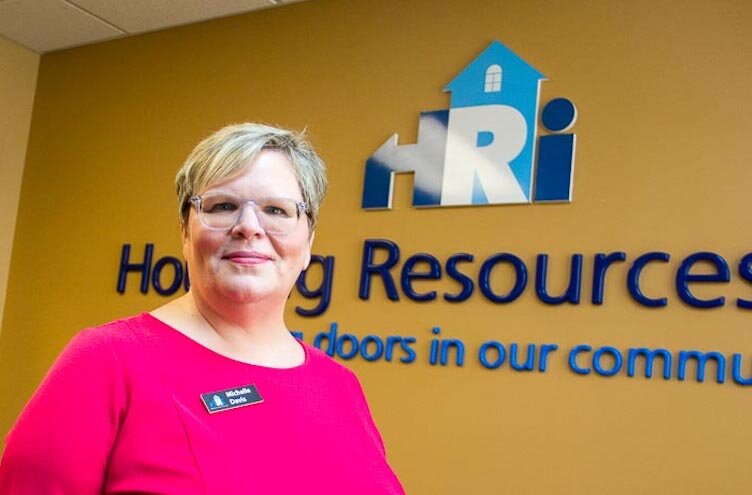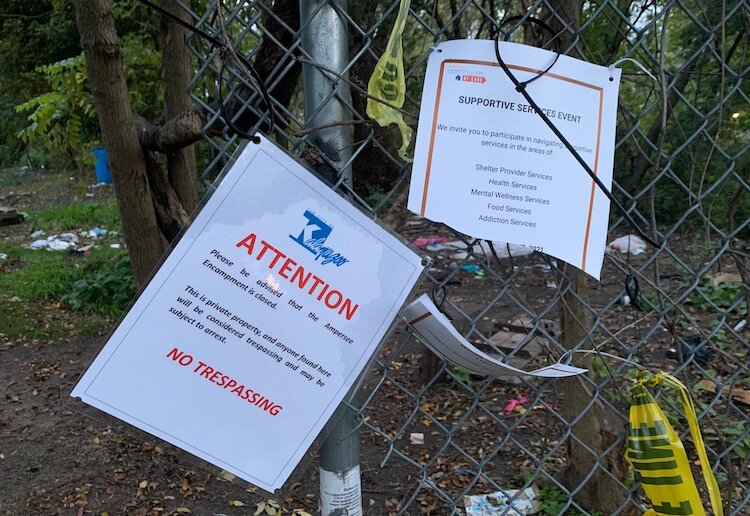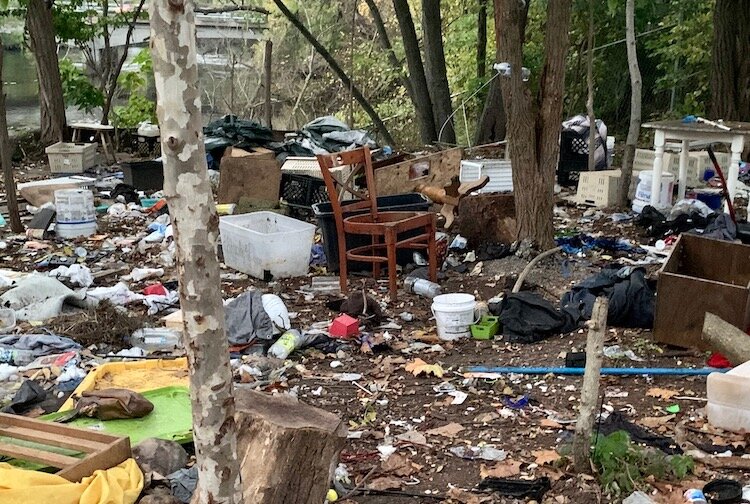A POD community? Kalamazoo nonprofit has a modular plan for the homeless – just in time for winter
Kalamazoo's Housing Resources Inc. says it wants to develop “A Kzoo POD Community,” of small modular housing pods to safeguard people who have been living outdoors in harsh and often unsafe conditions to be located in a space where residents define how they want to live.
Editor’s note: This story is part of Southwest Michigan Second Wave’s On the Ground Kalamazoo series.
A Kalamazoo nonprofit focused on helping people in crisis living situations is negotiating to lease a site for a more permanent location for those living in homelessness, a place where they can experience a new housing alternative.
Housing Resources Inc. says it wants to develop “A Kzoo POD Community” of small modular housing pods to safeguard people who have been living outdoors in harsh and often unsafe conditions. POD stands for Place Of Dignity — to be located in a space where residents define how they want to live.
“I just couldn’t imagine another winter going by with people in tents and tarps lying in the dirt and lying in the mud,” says Michelle Davis, executive director of HRI.
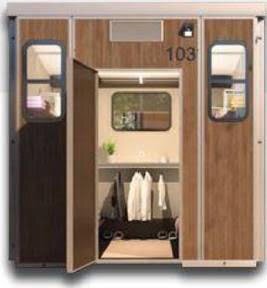
Before a large encampment of houseless people near Ampersee and Hotop avenues was disbanded last week, women were being victimized there, Davis says. Criminal activity and violence were on the rise, she says. Working in partnership with the City of Kalamazoo, HRI felt it had to take action. Steps taken by HRI were informed by regular meetings of a collaboration of local service organizations that was started to help address problems arising from the COVID-19 pandemic and has since continued to meet.
“People deserve a place to feel safe and secure,” Davis says. “The encampments were not safe for women, as many were victims of human trafficking and drug use and prostitution were rampant. With this project, HRI intends to provide a secure space for women and our most vulnerable people experiencing homelessness.”
HRI has struck an agreement with an Oregon company to purchase 50 modular housing pods to use. They are to be delivered to Kalamazoo starting in late November, just in time for winter. With lease negotiations still pending, the nonprofit organization cannot yet say where the future POD community will be located.
Davis says the site is near services important to the houseless, and it has a building that may be used to provide facilities such as a laundry, showers, restrooms, and a place to eat meals. She says it will also have a drop-off area for donations and a staging area HRI can use to disseminate them.
All of that will be a major upgrade from the tents, tarps, cardboard, and scrap wood setups that were the makeshift homes of dozens of people at encampments on the eastern fringe of downtown Kalamazoo.
At the same time, Davis says, HRI knows many of the houseless refuse to stay at the city’s primary housing shelter, the Kalamazoo Gospel Mission. Its rules separate men from women and children, meaning couples and full families may not stay together. It has guidelines for when patrons may come and go. It does not allow smoking or drinking. Its dormitories put people in close proximity. And it is a Christian-based service. Some people balk at such rules.
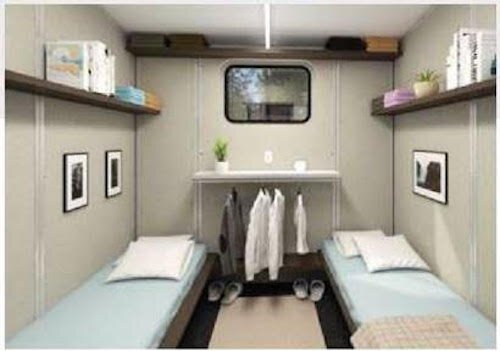
“We’ve listened, and we’ve heard their voices that emergency shelters are not for everyone,” Davis says. It is offering the POD housing as another solution.
The modular living units are called ModPods and are designed and manufactured by Portland-based LIT Solutions. (LIT stands for Living In Transition.) Made with powder-coated aluminum framing, insulated walls, and an aluminum composite exterior, they are designed to be waterproof, weather-resistant, and easily assembled transitional housing. Significantly, their construction uses no wood, making them less susceptible to fire.
“We have ordered 16 pods that have two beds. That would be for couples,” Davis says. “And 34 single units.”
The single units are 8 feet by 8 feet by 8 feet in size. The doubles are 16 feet by 8 feet by 8 feet. Each can be assembled by two people in less than an hour, according to information provided by HRI, and each will be lighted, heated, air-conditioned, and equipped with beds, mattresses, storage space, windows, a fire extinguisher, and exterior bicycle racks. Each can be connected to electric service. And each can be locked with a combination locking system.
“I feel positive about it,” Kalamazoo Mayor David Anderson says of what HRI is trying to do.
He says he has promoted the idea of structured camping for a couple of years “because I recognize that there are a group of people who have challenges with congregate shelters and rules, and they desire a situation that provides more independence. And there is also a group of people who are very resistant to services.”
Anderson says he is not involved with the project, as mayor or as director of housing and facilities for Integrated Services of Kalamazoo.
Acquiring the 50 pods is a $1 million-plus effort, solely funded by HRI at the outset. Equipped the way it wants them, the small pods will cost about $14,900 each. The larger units will cost about $29,400 each. HRI plans to apply for a $300,000 grant from the Kalamazoo Foundation for Excellence to offset some of the cost.
It also plans to apply for funding available through the COVID recovery act to help cover the cost of site improvements and support services for the project. An application also will be submitted for a grant from Consumers Energy that, if awarded, could net $100,000 to $200,000 more. (Supplying each pod with electricity will be an ongoing expense, estimated to be $30 to $50 per month, Davis says.) The nonprofit organization also expects to do other fundraising, hoping area companies will be willing to sponsor individual pods.
Housing Resources Inc., whose mission is to assure housing for socially or economically vulnerable people in Kalamazoo County, has an annual operating budget of $3.2 million to $3.6 million. The 39-year-old nonprofit organization also ovessees affordable housing developments that include the Rickman House in Kalamazoo, Rosewood Community in Kalamazoo, and Pinehurst Townhomes in Oshtemo Township.
HRI helps people find affordable housing, helps individuals apply for financial aid, and provides crisis intervention involving housing. It also helps renters avoid eviction and helps landlords avoid the costs associated with that. And it is the administrator of the COVID Emergency Rental Assistance program in Kalamazoo, which provides funding to help renters who are facing eviction as a result of pandemic-related hardships.
The Kzoo POD Community will be focused on houseless people who have significant reasons for not wanting to shelter in the Kalamazoo Gospel Mission, Davis says. They may include people with issues that make it difficult for them to be in large groups, and couples who want to stay together.
“Some folks will not take advantage of the current resources that are available,” Anderson says. Integrated Services of Kalamazoo repeatedly offered mental health services and substance abuse disorder services at the encampments. “And there is a group of people who are just not at a stage where they feel they want to take advantage of those options. So this provides another alternative,” he says of the POD community.
Regarding the proposed location for the POD community, Davis says, “I really can’t disclose it yet because we don’t have a lease in place. But I’m very excited about it. It’s going to be very nice and it’s not only going to give us the outside space for the pods, but it’s also going to give us indoor space for a lounge, for people to be able to come inside, watch television, just relax.”
“There’s even some space to decide if we want to have any other transitional housing for others and perhaps families,” Davis says. “But I think that would be a later phase if we decided to do that.”
The indoor space will be part of a building that is already on the site, Davis says. At the outset, the POD community will use about one acre of what is a multi-acre site.
The community will likely have a centralized outdoor gathering space and have offshoots from there into POD neighborhoods with perhaps eight pods each, Davis says.
“It’s really meant to be a space where they (the residents) define how they want to live and how they want to have the rules,” she says. “We’re looking at a housing-first approach (and) not have a whole lot of restrictions and rules.”
“Housing First” is a recovery-oriented approach to ending homelessness that centers on quickly moving people experiencing homelessness into independent and permanent housing and then providing additional supports and services as needed. The basic underlying principle is that people are better able to move forward with their lives if they are first housed. Housing is provided first and then supports are provided including physical and mental health, education, employment, substance abuse, and community connections.
HRI intends to have a regular onsite staff person and security at the Kalamazoo POD community. The security will primarily be intended to safeguard residents from outside harm, Davis says.
She says the idea for the POD community is the result of more than nine months of considering what could be done to resolve the needs of hundreds of unhoused people who have congregated in large encampments in the city.
The decision to move ahead with the POD community was informed by regular meetings of the Midterm Solutions Group, a collaboration of local service organizations that was started to help address problems arising from the COVID-19 pandemic. Its efforts have continued with representatives of the Urban Alliance, HOPE Thru Navigation, Integrated Services of Kalamazoo, the Kalamazoo County Housing Director’s Office, the Kalamazoo Gospel Mission, the Kalamazoo County Continuum of Care, the City of Kalamazoo, and HRI.
Davis says she agreed to purchase the pods about three weeks ago, during a visit to Portland to see them. Speedy action was necessary, she says.
“I put in a purchase order before I left Portland because if we didn’t do that, with all the shipping problems and everything going on around the world, we would be looking at 2022 and a price hike before we could do anything,” she says.
Police shut down the large encampment of houseless people near Ampersee and Hotop avenues by issuing a no-trespassing warning prior to a Sept. 29 closing deadline. A spokesman for the city said a majority of approximately 150 campers left the site before that deadline. Police then forced the remaining 50 or more campers to leave on Oct. 6. At least two officers were injured in struggles with people who have been described as advocates for the homeless (rather than people living at the encampment). Ten of them were arrested.
On Oct. 14, an encampment that had developed in a former mobile home park behind businesses in the 3400 block of Stadium Drive was also closed.
The Kalamazoo Department of Public Safety and the City of Kalamazoo were criticized harshly by advocates for the houseless for forcing people to move from the Ampersee location without the advanced warning that occurred before the Sept. 29 deadline. Much of that criticism was leveled at the Monday, Oct. 18, 2021, meeting of the Kalamazoo City Commission, when advocates repeatedly asked the city to stop the repeated sweeps of homeless encampments and drop charges against those arrested during the latest break-up of the camp.
In the meantime, city officials and community advocates have been looking for a longer-term solution for homelessness. Among ideas that HRI says did not pan out was using a sprung structure, a large outbuilding that resembles something like a professional football team might use as a practice facility. It would have necessitated building smaller living structures inside. Davis says, “It also had a price tag of about $5 million.
“So the same people who were showing us those approached me several weeks ago and said we have another product for you to look at,” Davis says. “As soon as they showed it to me, the next week I went out to Portland.”
She says she was convinced that the ModPod “has everything that someone needs to remain safe and secure and provides for their basic needs, all in one place.”
Davis says the narrative around helping the houseless in Kalamazoo has at times suggested that little is being done to help them, that there is not a sense of urgency to helping the houseless. She says that is not the case.
“I think it’s sad,” Davis says of such assertions by people who have been enthusiastically trying to advocate for the houseless in recent months. “It’s sort of disappointing because we’re all working toward the same goal. And my hope with this announcement is that all of those people that were doing, and that are doing, really good work for people who were at the encampments will join together and see this as the solution it can be — and want to help. Because we need everybody’s help.”

